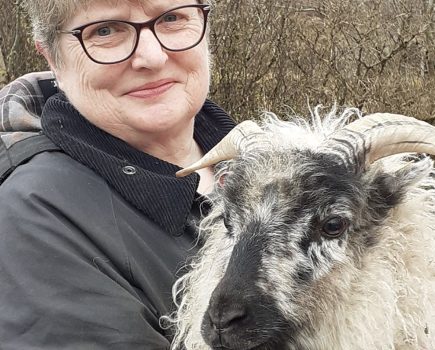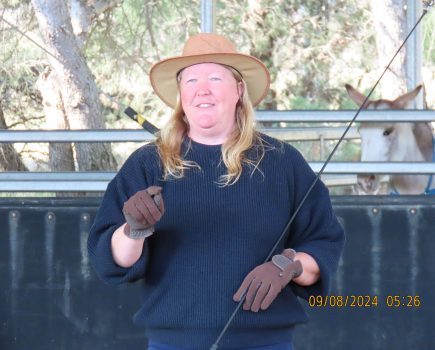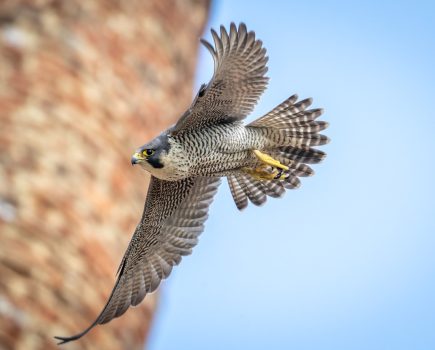Most smallholders move on to keeping some larger livestock. Pedigree breeds? Cross breeds? The choice is yours.
Keeping livestock involves responsibilty. The highest standards of animal welfare are essential, so it’s not something that should be entered into lightly. The type of livestock you can keep will depend to a large degree on how much land you have. However, animals aren’t just a pretty face!
It’s important to choose breeds that suit your purpose and your land. Most of all, choose a breed you like! Details for many of the breed societies can be found in the COUNTRY SMALLHOLDING BREEDERS DIRECTORY and they will be happy to go through the characteristics of their particular breed. All livestock must be kept humanely and with respect for their instincts and characteristics. They will thrive when their needs are well catered for and they’re well looked after. The guiding principles for animal welfare codes are the Five Freedoms: freedom from hunger and thirst, from discomfort, from pain, disease and injury, from fear and distress, and freedom to express their normal behaviour. You will need, of course, stock-proof boundaries, housing, equipment, all in place before any animals arrive, and with livestock keeping, even on a small scale, comes a significant amount of bureaucracy and form filling. Nonetheless, keeping livestock can be a very rewarding enterprise, supplying you with food, helping with the management of grassland or simply as company when you’re out and about and busy on your smallholding. Here we look at some of the options should you wish to take the next step, plus the details of organisations it may be helpful to contact. Pigs Pigs provide one of life’s three essentials, listed by William Cobbett in the 19th century: bacon (the others being bread and beer). Some people keep pigs as pets, but the usual reason for having them is either to produce meat from weaners raised for slaughter, or to breed particular breeds or cross breeds to sell. Interest in traditional breeds is reviving, as people rediscover the quality and taste of their meat, and the joy of producing their own pork. Cattle Even a single house cow requires sufficient pasture so your capacity to keep any cattle will first depend, apart from anything else, on the size of your smallholding. The Jersey is a popular breed among smallholders wanting a cow to provide milk for the household, but there are others, including cross breeds, that are good for dairy purposes. Sheep There are many different breeds of sheep – many developed for conditions in particular types of landscape, and this will be something to consider according to where your new smallholding is. Hill breeds, for example, are hardy and accustomed to ranging over open country, so will need more space. There are many white and coloured wool breeds for people interested in producing fleece for spinning and dyeing, others that are meatier breeds. Goats Goats are mainly dairy animals, although one breed in particular is good for meat: the Boer goat. They’re sociable, intelligent and curious and don’t enjoy being without a companion. Shelter is important as they dislike getting wet, despite their hardiness. Goats are browsers so pasture is less important, but they have particular feeding requirements. Bees Bees are amazing, productive creatures and they take up less space than other livestock. The best way to start is to join a local bee keeping group Registration and paperwork Before keeping any pig, sheep, cattle or goats, you need to first be registered with Defra and get a County Parish Holding number. The holding number relates to any land you own and which will be used by your livestock. You won’t be able to move any livestock onto your land without this number.
Paperwork Don’t be fooled by the small part – all smallholdings are, technically, agricultural holdings, or farms, as far as the paperwork is concerned. It makes no difference whether you keep two sheep as pets, or a breeding flock of 100 ewes, whether you have one house cow or a whole dairy herd. You will need to know about such things as flock and herd numbers, animal movement licences, stand still times, Identification of animals – tagging, slapmarks and so on, flock or herd book, poultry register, cattle passports, fallen stock… to name a few!
Useful contacts The Rural Payments Agency tel: 0845 603 7777 The Poultry Register Helpline tel: 0800 634 1112 or email poultryregister@defra.gov.uk Cattle movement: www.bcms.gov.uk, tel: 0845 050 1234 Defra Helpline, tel: 08459 33 55 77 or email helpline@defra.gsi.gov.uk Animal Health information line, tel: 0844 8844600 www.defra.gov.uk/animalhealth
Find out more British Goat Society: www.allgoats.com, tel: 01626 833168 British Alpaca Society: www.bas-uk.com Rare Breeds Survival Trust: www.rbst.org.uk British Beekeepers Association: www.bbka.org.uk British Wool Marketing Board: www.britishwool.org.uk







